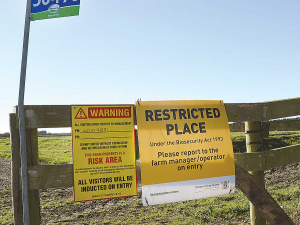NZ Catchment Groups Thrive with ‘Source to Sea’ Approach
The most successful catchment groups in NZ are those that have 'a source to sea' approach.
 A review of the Mycoplasma bovis eradication programme has found it is on track to achieve eradication.
A review of the Mycoplasma bovis eradication programme has found it is on track to achieve eradication.
An independent review of the Mycoplasma bovis eradication programme has found it is on track to achieve a world-first eradication and makes recommendations to improve the wider biosecurity systems.
The review found that the programme, a partnership between the Ministry for Primary Industries (MPI), DairyNZ and Beef + Lamb New Zealand, has made many improvements after it scaled up quickly to prevent spread of the disease.
“We have come a long way since the programme started,” says M. bovis Governance Group independent chair Kelvan Smith. “The improvements made to the Programme have prevented the long-term financial and animal welfare costs of endemic M. bovis in herds.
“There’s no denying the disruption and stress experienced by farmers affected by the eradication Programme and this review will help to ensure we have better systems and support in the future for disease responses,” Smith says.
The review panel’s recommendations covered areas focused on responding to animal diseases – all of which MPI and its partners have accepted and are implementing.
MPI Director-General Ray Smith says the M. bovis Programme has provided valuable lessons for future disease responses. These were being applied to areas of work like the Foot and Mouth Disease Readiness Programme.
“The M. bovis Programme has already led to changes across the biosecurity system, however, there’s always room to improve and the review panel’s recommendations will help us in the future.
“One of the key recommendations is that we all need to work more closely together to ensure the right capability and support is in place for people affected by a disease incursion.”
Improvements already made or under way include:
Review chair Professor Nicola Shadbolt says the panel considered the evolution of the M. bovis programme from its start in 2017 to today.
“Our review was informed by the experiences of both farmers and those who worked in the Programme. We acknowledge the significant impact the eradication has had on farmers and rural communities, as well as those working on the programme.
“A large number of people, including our farmers, worked incredibly hard to get to where we are now. Unique tools and capability have been built, which put us in a great position and we’re on track to be the first country in the world to eradicate M. bovis,” she says. “We now need to make sure we capture these lessons learned, improve our preparedness for the next animal health response, have a world class biosecurity system that all players commit to, and that will deliver.”
DairyNZ Chair Jim van der Poel and Beef + Lamb New Zealand Chairman Andrew Morrison say the review showed a lot of improvements had been made to the delivery of the programme and highlighted what could help biosecurity responses in the future.
“The biosecurity response and management of M. Bovis has been challenging, especially for our farmers directly affected,” says Jim van der Poel.
“The review will help ensure that Government and industry are better prepared for any future incursion. It’s vital we get it right for farmers.
“Establishing a cross government and industry working group, coupled with ongoing biosecurity and farm management practices, will help strengthen the work we do,” he says.
Andrew Morrison says: “We owe it to those farmers affected by M. bovis to ensure the eradication programme and future biosecurity responses are the best they can be.”
“Implementing the recommendations of this independent review will go a long way to strengthening our biosecurity system, which will prove vital in the face of any future incursions.
“By working together, and with the right commitment, we can make the necessary and enduring improvements to biosecurity. We look forward to working in partnership with MPI to achieve this.”
The Meat Industry Association of New Zealand (MIA) today announced that Chief Executive Officer Sirma Karapeeva has resigned from the role.
The winners of the 2026 Hawke’s Bay/Wairarapa Dairy Industry Awards were announced at the annual awards dinner held at Copthorne Solway Park in Masterton on Thursday evening.
Environment Southland is welcoming this week’s decision by the Environmental Protection Authority (EPA) to approve the release of Blaptea elguetai, a leaf‑feeding beetle that will help control the highly invasive Chilean flame creeper.
This March, the potato industry is proudly celebrating International Women’s Day on 8 March alongside the International Year of the Woman Farmer, recognising the vital role women play across every part of the sector — from paddocks and packhouses to research, leadership, and innovation.
Fruit trader Seeka posted a record profit and returns to shareholders in 2025.
Recent weather events in the Bay of Plenty, Gisborne/Tairawhiti, and Canterbury have been declared a medium-scale adverse event.

OPINION: A mate of yours truly reckons rural Manawatu families are the latest to suffer under what he calls the…
OPINION: If old Winston Peters thinks building trade relations with new nations, such as India, isn't a necessary investment in…